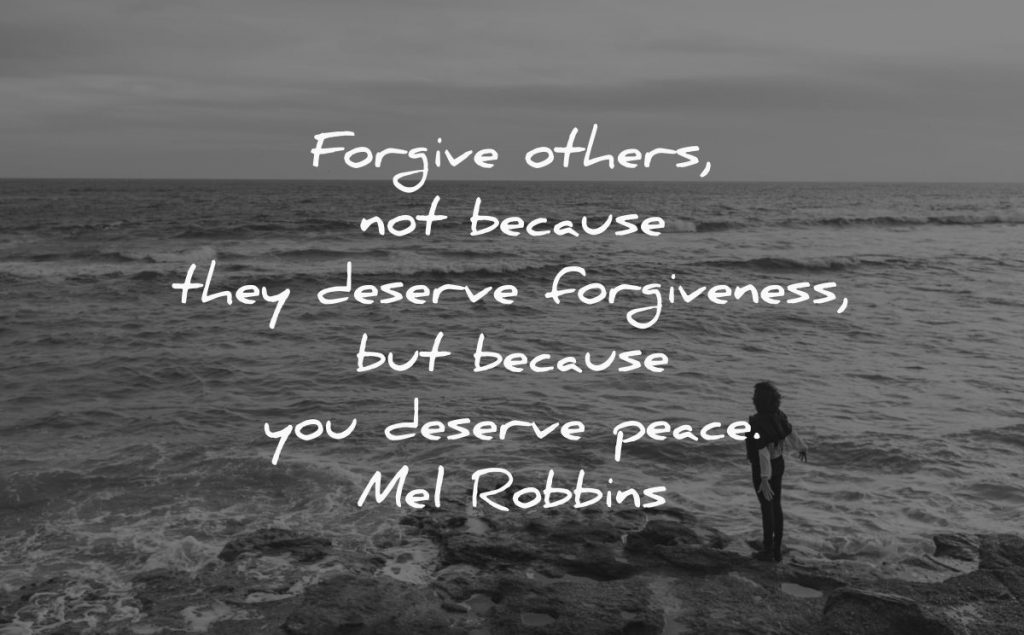Forgiving is not forgetting. When life hits us hard, forgiveness is the best medicine for healing deep wounds. Forgiveness is something you do for yourself and it involves both acceptance and forgiving yourself too.

Acceptance means you have forgiven yourself for not liking yourself, for giving in too much, for being naïve or trusting, for not listening to that inner voice or suspicion, for what you did in a relationship or at work or with your family.
Forgive yourself for putting up with excuses, for taking the blame because it was easier or just for losing the real you. Acceptance is your personal forgiveness. If you can’t achieve self-forgiveness, then you won’t be able to offer forgiveness to others and that will keep you from moving forward.
“Forgetting the past can seem helpful in the process of healing, but can be harmful to your future,” warns LMSW, sex and relationships therapist Carli Blau. If you want to grow after an emotionally difficult situation, you should address what caused the situation as well as the emotions surrounding it — no matter how painful it is. Just forgetting does not give you the opportunity to learn from mistakes and give you the experience to see a problem on the horizon and make corrective action.
Here are a few pointers on forgiveness. Think about how you could you use them for your benefit.
Why does forgiveness matter?
Working on forgiveness can help us increase our self-esteem and give us a sense of inner strength and safety. It can reverse the lies that we often tell ourselves when someone has hurt us deeply. Forgiveness can heal us and allow us to move on in life with meaning and purpose. Studies have shown that forgiving others produces strong psychological benefits for the one who forgives. It has been shown to decrease depression, anxiety, unhealthy anger, and the symptoms of PTSD. But we don’t just forgive to help ourselves.
Identify what needs healing and who needs forgiving
Figure out what hurts have contributed to your inner pain and need to be acknowledged. You might have to dig deep and listen to your inner voice. This will give you an idea of who needs forgiveness in your life and provide a place to begin.
Acknowledge the hurt, how it affects you and work to release it by forgiving
Acknowledging hurt is the first step to healing. Accepting your vulnerability is not only part of the process of healing, its one of the truest demonstrations of strength. It might be self-esteem, confidence, fear, or trust. Whatever it is, each acknowledgment moves you ahead and makes you stronger.
Decide on Forgiving
If someone hurt you deeply, you probably aren’t ready to just let it go. In fact, you may be holding on to your anger pretty tightly. That’s human nature. On a heart level, you don’t feel able to forgive. But on a head level, make a decision that you are willing to forgive. We all carry wounds in our hearts, empathy is connected to forgiveness and is an important step in the process. Open the door to the possibility of forgiving the person that has hurt or offended you.
Refuse to be a victim
As you move away from your role as victim you release the control and power the offending person and situation has had in your life.
Our emotional well-being improves with proper attention and care. When we process and heal, we make the future better Instead of repeating unhealthy patterns (i.e. dating the same kinds of toxic people or working in oppressive environments), we recognize problems and take action to address them. We set up boundaries and are less likely to become a victim.
Get Help
Consider joining a support group ,seeing a coach or counselor.
Sometimes the hurt from our emotional battles runs deep or we are unable to find firm ground and work on forgiveness. Maybe you just need someone to talk with. Reach out. There are support groups and coaches and other professionals to help. The most important thing is that you are moving forward. Holding on to anger can eat us up, forgiving can set us free.
Related Articles:
* Please leave a comment below. You may comment anonymously or you may use your first name. We may post or quote your comment on the website. We will never post or share your last name, email address or any other personal identifying information.
